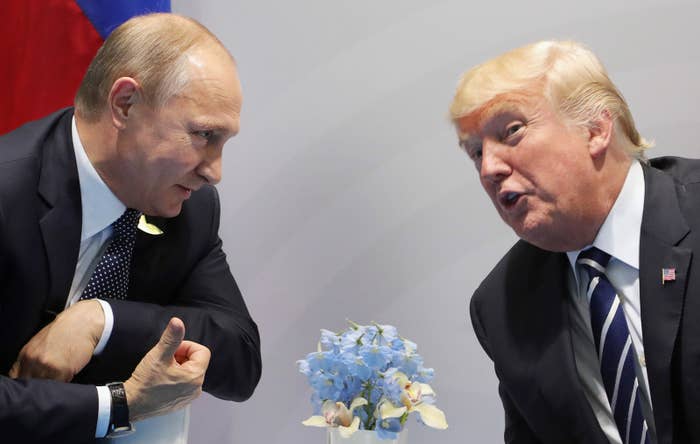
The White House on Friday evening announced that President Donald Trump intended to sign a bill that would require congressional approval before he could lift sanctions currently placed on Russia.
"President Donald J. Trump read early drafts of the bill and negotiated regarding critical elements of it," said a statement released from press secretary Sarah Huckabee Sanders. "He has now reviewed the final version and, based on its responsiveness to his negotiations, approves the bill and intends to sign it."
The move came a day after Congress approved a new measure toughening economic sanctions against Russia while keeping current sanctions on the country in place until Congress can review and approve any attempt to remove them. The bill, which was passed by the Senate on Thursday, also added new economic penalties against Iran and North Korea.
Despite weeks of vacillating from the president's spokespeople over whether Trump would sign the bill, it passed easily by a margin of 98–2. Only Sens. Bernie Sanders and Rand Paul opposed the measure.
The House of Representatives voted 419–3 to enact the sanctions package on Tuesday, giving it a veto-proof majority moving forward. Two-thirds of both the House and Senate are required to overturn a presidential veto.
Following the House vote Tuesday, Sanders had only said that Trump had been “very vocal about his support for continuing sanctions on those three countries” but would wait to see what the final legislation looked like.
Sen. Bob Corker, who chairs the Foreign Relations Committee, told reporters after the vote that he had spoken to both Trump and Secretary of State Rex Tillerson over the last week and had received "no indication whatsoever that they plan to consider a veto."
“When you have this kind of overwhelming vote, you know... I can’t speak for them, but if I were advising them, to even consider vetoing something with this support is not probably in anybody’s interest. ... They can count. They understand the math," he added.
Senators from both sides of the aisle spent the short window of time debating the bill on the floor Thursday night not so much trying to convince their counterparts, but praising each other for its bipartisan nature.
Sanders, one of just two no votes, said on Twitter following the vote that while he supported the sanctions on Russia and North Korea, he opposed the bill because he "worr[ies] very much about President Trump’s approach to Iran."
Russia, on the other hand, has said that the legislation further threatens relations between Moscow and Washington, which have been icy for the last several years. The current sanctions were put into place by the Obama administration in response to Russia's annexation of Crimea in 2014, its support for rebels in eastern Ukraine, and its interference in the 2016 US election.
Russia retaliated to new US sanctions on Friday by ordering the US embassy in Moscow to reduce its staff and by seizing American diplomatic properties in the country.
The Russian Foreign Ministry said the US embassy staff should be reduced to 455, matching the number of Russian diplomats in Washington, and that it was seizing holiday properties and a warehouse used by US diplomats.
But Sen. Mark Warner, the top Democrat on the Senate Intelligence Committee, which is investigating Russian interference in the 2016 election, praised the near unanimous vote on Thursday.
“This bill passed with overwhelming majorities in both the Senate and the House, sending a strong message to Vladimir Putin that attacks on our democracy will not be tolerated," Warner said in a statement. “President Trump should sign this bill as soon as it hits his desk. Otherwise, he risks encouraging Russia’s interference in future elections.”
Asked whether signing the bill would indicate that Trump believes Russia interfered in the 2016 election, something he has been reticent to say, Corker said likely not. But, he added, "I think the lack of strong statements in that regard probably affected the outcome on this piece of legislation.”
Lissandra Villa contributed to this report.
CORRECTION
Russia's annexation of Crimea took place in 2014. An earlier version of this article misstated the year.
